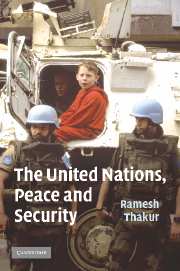Book contents
- Frontmatter
- Contents
- List of figures
- List of tables
- Foreword, Gareth Evans
- Acknowledgements
- Introduction
- PART I An international organisation for keeping the peace
- PART II Soft security perspectives
- PART III Hard security issues
- 7 The nuclear threat
- 8 International terrorism
- 9 Kosovo 1999
- 10 Iraq's challenge to world order
- 11 The responsibility to protect
- 12 Developing countries and the eroding non-intervention norm
- PART IV Institutional developments
- Conclusion: at the crossroads of ideals and reality
- Index
7 - The nuclear threat
Published online by Cambridge University Press: 24 May 2010
- Frontmatter
- Contents
- List of figures
- List of tables
- Foreword, Gareth Evans
- Acknowledgements
- Introduction
- PART I An international organisation for keeping the peace
- PART II Soft security perspectives
- PART III Hard security issues
- 7 The nuclear threat
- 8 International terrorism
- 9 Kosovo 1999
- 10 Iraq's challenge to world order
- 11 The responsibility to protect
- 12 Developing countries and the eroding non-intervention norm
- PART IV Institutional developments
- Conclusion: at the crossroads of ideals and reality
- Index
Summary
‘We are approaching a point at which the erosion of the non-proliferation regime could become irreversible and result in a cascade of proliferation.’
‘One cannot worship at the altar of nuclear weapons and raise heresy charges against those who want to join the sect.’
This book began with the assertion by the High-Level Panel on Threats, Challenges and Change that a common understanding on the use of force is necessary for revitalising the role of the United Nations in the twenty-first century. The most lethal force known to mankind so far is nuclear weapons. As the above quotes show, the subject of nuclear arms control and disarmament is back on the international agenda with a vengeance. The triple crisis arises from non-compliance with obligations of the Non-proliferation Treaty (NPT) by some states engaged in undeclared nuclear activities and others that have failed to honour their disarmament obligations; states that are not party to the NPT; and non-state actors seeking to acquire nuclear weapons.
- Type
- Chapter
- Information
- The United Nations, Peace and SecurityFrom Collective Security to the Responsibility to Protect, pp. 159 - 180Publisher: Cambridge University PressPrint publication year: 2006



